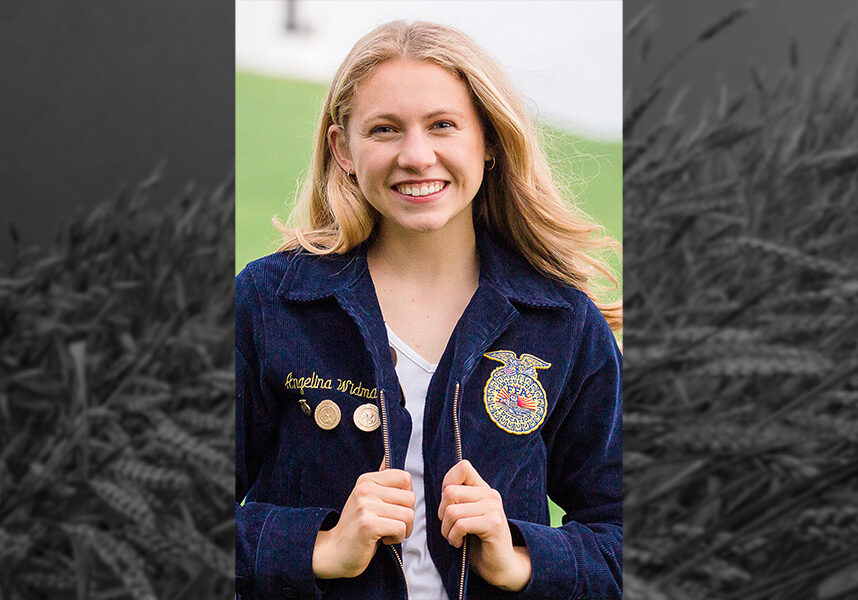Learning the ropes Wheat Ambassador finds policy work for Washington wheat industry an adventure
2023April 2023
By Angelina Widman
Washington Wheat Ambassador

Sometimes, when you sign up for something, you’re not sure what you are getting into. I thought I might be a good fit for the role of a wheat ambassador for the Washington Association of Wheat Growers (WAWG) due to my FFA experiences in public speaking, but I had no idea the opportunities that the leadership of WAWG had in store for me! Soon after being selected as an ambassador with my friend, Shaley Tiegs, I presented a speech at the Tri-State Grain Growers Convention in November on Washington’s Climate Commitment Act. In January, Shaley and I traveled to Olympia with WAWG, and a few days later, to Washington, D.C., and soon after that to the Spokane Ag Show. You really have to stay on your toes to keep up with them, but I was honored to watch and learn what WAWG does as an organization and for wheat growers, not only in the state, but nationwide with the National Association of Wheat Growers. It has been an eye-opening process to a kid who has had very little experience in politics. Learning how lobbying works is a whole lot different in person than learning out of a textbook in the classroom!
Starting at the end of January, with help from KayDee Gilkey, our ambassador coordinator, Shaley and I traveled to Olympia where we lobbied for two days on Capitol Hill. There, we met with many of our state and county representatives. We also were given the “sweet” opportunity to pass out cinnamon rolls to those in the Capitol Building, which gave us the chance to share a few facts about the wheat industry and talk to people one on one.
We spent our time with our state lawmakers informing them of upcoming and concerning bills that had passed or were being considered, such as the new Climate Commitment Act. Originally, this law exempted certain agricultural fuel uses, however, there is no mechanism in place for farmers to receive these exemptions. We also discussed a voluntary riparian buffer bill that was based off of last year’s Lorraine Loomis Act and would incentivize landowners to plant trees and take land out of production. The removal of the Columbia and Snake river dams was yet again another hot topic to address, and through all of these issues, I learned how to lay out and present an agenda of important policies.
Beyond Washington state’s policies, there was a federal level of policies to address in Washington, D.C., such as the upcoming farm bill with crop insurance as the main highlight, issues with trade policy and foreign land acquisition, transportation along the BNSF rail lines, and Columbia and Snake river dams. Shaley and I were able to sprinkle in several wheat facts during those meetings. After a full day of lobbying on Pennsylvania Avenue, we were treated to a dinner where we ate and spoke with staff members from the congressional offices and with members from the Washington and national wheat organizations. I enjoyed meeting so many of the people I saw earlier in the day who I did not have a chance to visit and get to know until then.
While on our trip in D.C., Shaley and I were given a day to tour the city and as many national sites as possible. We did day and night tours of the monuments, such as the National Archives, American and Natural History museums, the Ford Theater, and the Washington, Korean War, and Lincoln monuments all before flopping on our beds to get a few hours of sleep before we flew home early the next morning. I felt like a true tourist that day!
Throughout the trips we took, I was amazed watching people like Michelle Hennings, Andy Juris, Diana Carlen and Mary Palmer Sullivan, among many others, work so efficiently and effectively with policymakers on all parts of the political spectrum. They certainly know how to do it! In addition, not only did I get to watch and listen to Mary speak with important politicians for the wheat and barley industry in Olympia and D.C., I watched her give a speech to the FFA at the Spokane Ag Show a few days later! Like Mary often says, there are no strangers in the agriculture world — you can always find a connection. I felt that everywhere I went with WAWG and even afterwards at my grandma’s local church auction in Eltopia, Wash., where I could relate and talk to several of the farmers who knew all about WAWG.
Reflecting on all the activities WAWG has given me the opportunity to experience, I am impressed by how much work goes on behind the scenes. To run an effective organization and lobbying group like WAWG takes more work than I originally thought, and it is awesome how many people give their time to make it all happen.
When I applied as a WAWG ambassador, I originally thought of it as only a scholarship. While that is part of it, the adventures they have invited me on are experiences few my age have had, and I will always remember them. And this year is just getting started — I can’t wait to see what is next!
Tags












